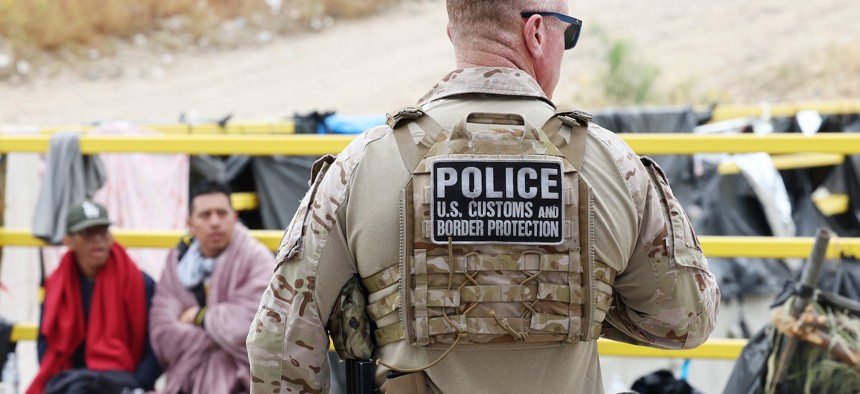
A Customs and Border Protection officer keeps watch as immigrants are transported from a makeshift camp between border walls between the U.S. and Mexico on May 13, 2023 in San Diego, Calif. The fiscal 2023 omnibus funding bill provided $60 million for 125 new CBP officers, 250 technicians and 250 support staff. Mario Tama/Getty Images
Pay raise and staffing surge at the border advance at Senate panel
Bipartisan bills would approve a 14% pay bump for some personnel.
A Homeland Security Department component could soon receive more staffing and better pay for its employees after a Senate panel on Wednesday advanced two pieces of legislation to accomplish those goals.
The Securing America’s Ports of Entry Act (S. 1253) would require Customs and Border Protection to hire at least 600 additional officers per year until the agency meets its staffing goals. The agency has for years decried its high vacancy rate, dating back to the Obama administration saying it was short thousands of necessary staff at U.S. ports of entry. CBP’s staffing levels have remained flat throughout the Biden presidency.
The bill would also authorize hiring for more support staff, which lawmakers said would allow law enforcement to focus on their jobs. It would provide better infrastructure and equipment to protect officers who inspect international goods and are potentially exposed to dangerous drugs and toxins and task CBP’s Office of Field Operations with updating its staffing model.
The fiscal 2023 omnibus funding bill provided $60 million for 125 new CBP officers, 250 technicians and 250 support staff.
Sen. Gary Peters, D-Mich., who chairs the Senate Homeland Security and Governmental Affairs Committee that held Wednesday’s markup and introduced the hiring measure, said his bill would “address the critical shortages of [CBP] officers who work each day to facilitate trade and travel in our parts of ports of entry, while also ensuring the security of our nation.”
The Border Patrol Enhancement Act (S. 1444) would address a longstanding issue of Border Patrol agents not receiving full pay for their overtime hours worked. To correct the matter, lawmakers approved increasing the pay for agents in General Schedule-12 positions—the grade for most agents in the component—by at least 14%. DHS leadership would have the authority to make other adjustments as necessary. In the current system, some agents do not receive any overtime pay for working more than 80 hours in a two-week pay period.
“At the time we're asking more of Border Patrol, we're not compensating for them,” said Sen. James Lankford, R-Okla., who introduced the bill. “That is not right to just cut off their compensation at that point.”
Lankford said the Biden administration, including DHS and the Office of Personnel Management, have signed off on the change. After publication of this story, however, OPM rejected Lankford’s characterization of its support, saying instead it provided only technical assistance to the bill and it has concerns about the bill’s policy implications. Sen. Kyrsten Sinema, I-Ariz., who cosponsored the bill, said it would help with Border Patrol's recruiting and retention issues. Congress approved the hiring of 300 new Border Patrol agents in the fiscal 2023 omnibus spending bill.
“When I visit my border in Arizona and hear directly from our agents, they tell me how thinly they are spread and how their pay doesn't keep up with the financial responsibilities to their families,” Sinema said.
The bill would require Border Patrol to develop a new staffing model, which Lankford said Congress has been trying to ascertain for more than a decade. Earlier this year, a Border Patrol official told lawmakers his agency currently has 19,300 employees, but needs around 22,000 to function properly. CBP has for years reassigned both field officers and border agents to address various influxes of encounters at the southern border. President Biden this year sent 1,500 military personnel to support Border Patrol operations there.
The committee approved both bills with bipartisan support. The panel approved a similar measure to increase CBP officer hiring in 2019, but it never received a vote before the full Senate. Rep. Tony Gonzales, R-Texas, has already introduced companion legislation (H.R. 2837) in the house to the Border Patrol pay bill.
This story has been updated with additional information from OPM.







